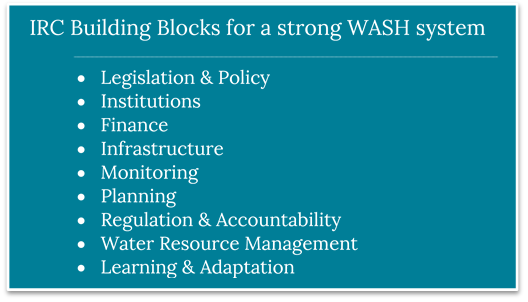We need evidence that strong WASH systems provide reliable WASH services.
Published on: 21/08/2017

One key purpose of organisational and programme monitoring is adaptive management. Analysis of monitoring data is important to see if planned activities are being realised as expected; and, if the strategy is still fit to address overall objectives (i.e. is our plan delivering the changes we want it to?). Organisational monitoring provides a foundation for reflection and self-analysis, creating a solid foundation for management decision making. This means that, in practice, what is measured and how it is measured is highly influential for decision making and has long term implications for the organisational strategy.
In the case of IRC, what matters is sustainable progress toward universal water and sanitation service delivery (starting) in the districts and countries where we work. Something that is true for most others in the sector. What is perhaps less common, is that we believe that the way to achieve that is to build local and national WASH systems that are strong and capable of expanding and maintaining the services - while reducing reliance on external support. IRC works to create strong local WASH systems, and to know how we are doing we need to measure their strength.
This doesn’t mean we don’t also need to measure the WASH services that these systems deliver; or indeed the impact of those services. We do. But a key part of assessing the progress of our work is to measure the actual strength of the local WASH systems where we work.
Achieving the ambitious Sustainable Development Goals will not be easy. The persistent challenges faced in the WASH sector are evidence that the financing, development, monitoring, and maintenance of WASH services in a resource constrained environment require a large number of people, policies, and technologies (the WASH system) to work together. It is important to take stock of different aspects of the WASH system in all its complexity, but we also cannot and do not wish to measure everything. To make this manageable, we have therefore identified key building blocks, each of which can be independently understood and they collectively provide a structure for dealing with the complexity in a manageable and digestible format. The building blocks come from our experience of how the complexity of the whole WASH system can be broken down into something that is measurable, and equally importantly, makes intuitive sense to actors within the system.
In our focus countries IRC will annually perform an assessment on WASH systems strength; using a series of guiding questions and diagnostic tools developed to assess and measure the core elements of each building block. We’ll also measure the WASH services being delivered by the system. This will provide us with a basis for thinking about the whole WASH system and to assess the current state and trajectory of the different system components. Seeing which building blocks are the strongest and weakest at both district and national level can help to identify priority actions and required support. Reflecting periodically on all the building blocks, and whether improvements in one or more are leading to measureable improvements in services delivered, helps to keep an eye on the big picture, and to see if our approach is working or not. And when not, helping to identify an appropriate course for correction.
IRC believes passionately that the only sustainable solution to the WASH crisis is to build strong local WASH systems. However, we also understand that this belief needs to be underpinned by evidence. Evidence that strong WASH systems do indeed provide good WASH services; evidence that allows us to flex and adapt over time. We believe that by monitoring our nine WASH system building blocks, together with the WASH services delivered, we can provide that evidence. What’s more, by making the building blocks and their linkages to WASH services visible, we are convinced that we can make them and the entire WASH system matter.

At IRC we have strong opinions and we value honest and frank discussion, so you won't be surprised to hear that not all the opinions on this site represent our official policy.